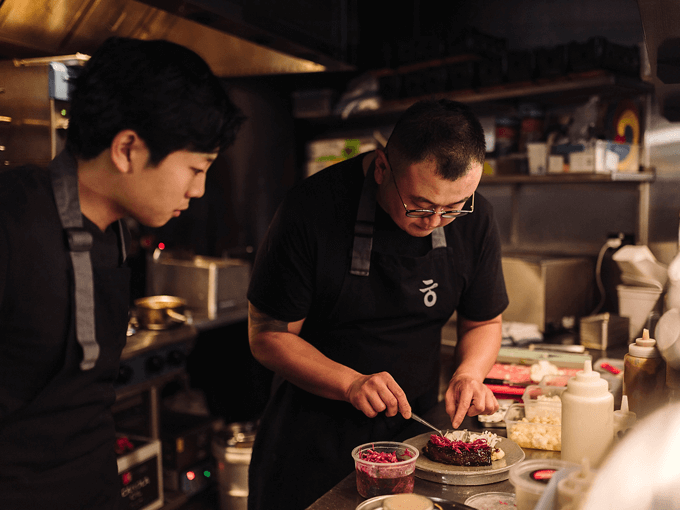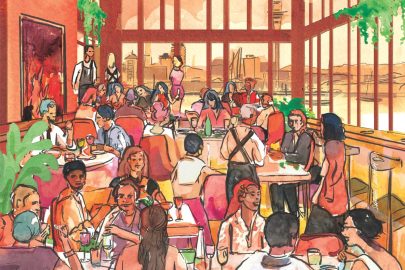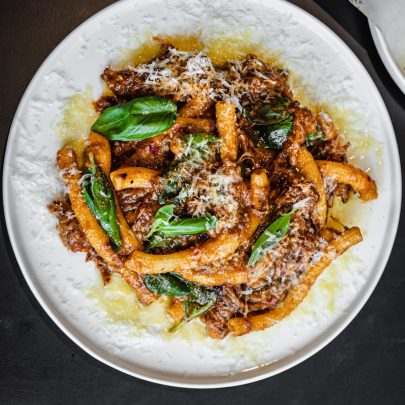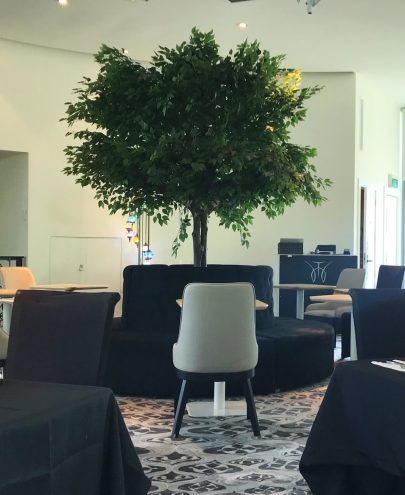May 21, 2019 Restaurants
Min Baek’s food pushes boundaries — it isn’t meant to be traditional — but the driven chef admits criticism from his fellow Koreans still cuts deep.
Kimchi is Korean soul food. Napa cabbage ferments in gochugaru, garlic, ginger, sea salt and fish sauce until delightfully pungent, spending a couple of days out in room temperature to develop its complex flavours. It’ll usually make an appearance on the family table every day, a complementary side dish.
When I ask Min (Kwangmin) Baek, head chef and co-owner of Han, if there is any Korean food he wouldn’t alter, that it may seem blasphemous to do so, he tells me kimchi. “It’s a really beautiful food, because it has texture, acidity, a little bit of heat, it brings other dishes together. As a chef, kimchi is just really, really good.” Ten minutes later, unrelatedly, he says, “I make vegan kimchi, without seafood sauce. We take shiitake mushroom and ferment it for longer. Once I tried that, I haven’t had any other kimchi — the flavours are clearer, refreshing. A balance, like a harmony.”
Han first entered Metro’s Top 50 restaurants list last year. It opened its doors just the year before. Baek, 37, doesn’t pretend that his food is “authentic” Korean; his painful self-awareness of what seemingly appeals to the Auckland market spills over into most of our conversation. He’s no martyr, though. His cooking isn’t meant to be considered as pure or traditional. Food, he believes, shouldn’t have any boundaries.
That’s a sentiment he cultivated as his career as a chef progressed in the kitchen of Michael Meredith, who took a chance on him. “I was waiting outside of the restaurant and I saw him walk out — I’d never seen him before, but I recognised him from his photos, his tattoos. When I told him I was looking for a job, he said, ‘Okay, come tomorrow and have a look.’ I worked there for almost three years. His cuisine doesn’t have limits. Even if the combinations were sometimes weird, the flavour was always really, really good.”
Baek’s food is billed as “modern Korean”, or “Korean with a French twist”. It’s partly a smart business decision to appeal to what people know, and a disclaimer for the non-Korean flavours and ingredients that pepper Han’s menu. French techniques are used: in Korea, beef short rib (galbi) is traditionally braised over a long period of time, but at Han it’s cooked sous-vide for even longer, to retain its moisture. It is, he explains, food “made funny”. Funny could be the truest way to describe modern cuisine: after all, isn’t it just the pursuit of taking something with an established history and twisting it to make it different, more interesting… more “funny”?
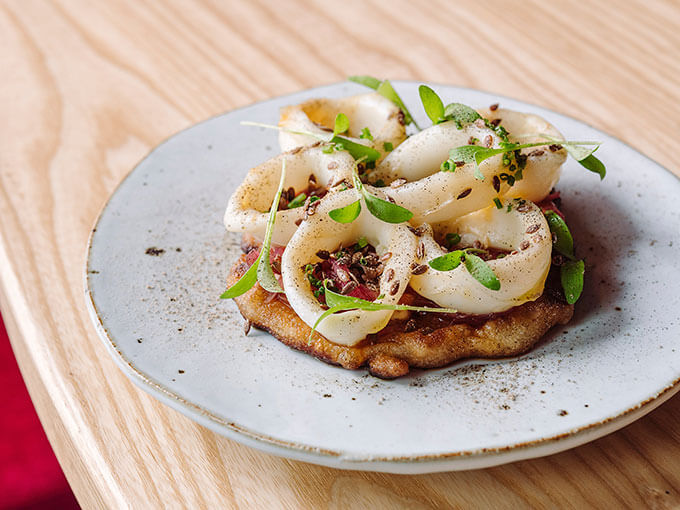
Like all art, sometimes it works, and sometimes it doesn’t. Baek recalls a moment of inspiration in which he was going to turn samgyetang (ginseng chicken soup) on its head, making it cold. “Some tomatoes, some umami, some textures, some date purées. Okay, let’s go. I made it, and it was beautiful. And then when I tasted it…” He devolves into a laughing fit. I join, too, because his laugh is joyfully infectious, and also because I can taste it in my mind. Samgyetang is a glorious soup served scalding hot, herbal and healing. Cold, I imagine, it’s medicinal.
There’s plenty that does work, though: the beef yughoe (tartare), usually seasoned simply with soy sauce and sesame, is dotted with crispy anchovy and cashew, a strong blue-cheese ice cream quenelled on the side. It fights with your internal Rolodex of Korean flavour, the cheese adding bite where you might expect spice. The restaurant’s essential dish is written in its industrial piping, futuristic extractor fans making it possible to enjoy a trio of tender meats grilled over a graceful charcoal brazier and later wrapped in minty serrated perilla leaves. This is tradition reworked: not made better, Baek insists, and not “improved”, but different.
Working at Merediths was Baek’s big break, coming much later on a timeline that started at a Korean restaurant on Queen St, where he worked as a dishwasher. It was his first job in New Zealand after moving here 12 years ago from Busan, a port city in South Korea. After a stint learning pastry making at culinary school, and a baking job in Wellington, he moved back to Auckland and spread his CV to top restaurants, using Metro’s Top 50 as a guide. “I wrote down in my CV, ‘I don’t need the money. I want to know what’s going on, and I want to learn — please give me a chance.” No joy, so it was back to university (cooking, this time), where he also scored a role as a stage (an unpaid intern) at The Grove . His first job was cutting chives, and it took an hour. But it opened his eyes to the finer things in life — and in food. “Oh, this is not going to be easy, but it’s worth a try.”
Baek is living life on the edge. Not as a bad-boy chef — thank God, do we really need any more of those? — but as one always looking over at something new, and not quite leaping. He thinks Korean food is still in its early stages in Auckland — an introduction, not quite there yet. And maybe he’s right. After all, Han is only the second Korean restaurant to make the Top 50 (Faro, in Lorne St, made the list in 2011). “When Han settles down, I can become more authentic, and add more aromatics, more spice. I have a lot of ideas in my head.”
The necessity of Baek’s restaurant is it expands on what Korean food can look like in Auckland, and hopefully opens the door for further experimentation and play within our city. Baek is quietly ambitious — or perhaps not so quietly — as plans tumble out without much coaxing. He tells me he dreamed of doing a degustation menu right from the beginning, but sensei Meredith said it wasn’t a good idea. “He told me, ‘You need a name first; no one knows who you are yet. Once you get a name, then you can do it.’ Well, I’m waiting!”
When I ask if he thinks Auckland isn’t ready for the type of food he wants to cook, he laughs. “Korean food just has so much scary stuff. At Merediths, Chef served a clam that was moving on the plate, and some people didn’t even want to touch it. The flavour is really fresh, full of flavour, but it looks scary. I want to make sashimi with live fish — that’s how we eat it in Korea.” As a raw-fish enthusiast, and a devotee of Auckland food in general, I try to convince him we’re ready for it, ready for what he really wants to cook. “Oh, I don’t know.” He laughs again.
Baek’s show of vulnerability and humility is refreshingly at odds with the usual image of a rock-star chef. Perhaps it comes from trying to do something new with food that’s so culturally close to you, an endeavour that brings up struggles with identity and passion. “The bottom flavour of my food is my flavour — the flavour I grew up with. But when I try to introduce new things, I always worry too much about what Koreans are going to tell me… what is the complaint about that, and what are people going to tell me about the price point? There are so many different things coming at me at once before I introduce a dish, and it makes me smaller and smaller, and less confident. Sometimes I’m confused — what am I doing wrong? If people don’t want that, do I keep doing this or not? And sometimes it breaks me, actually. When I get bad reviews by Korean people, it takes time to heal.”
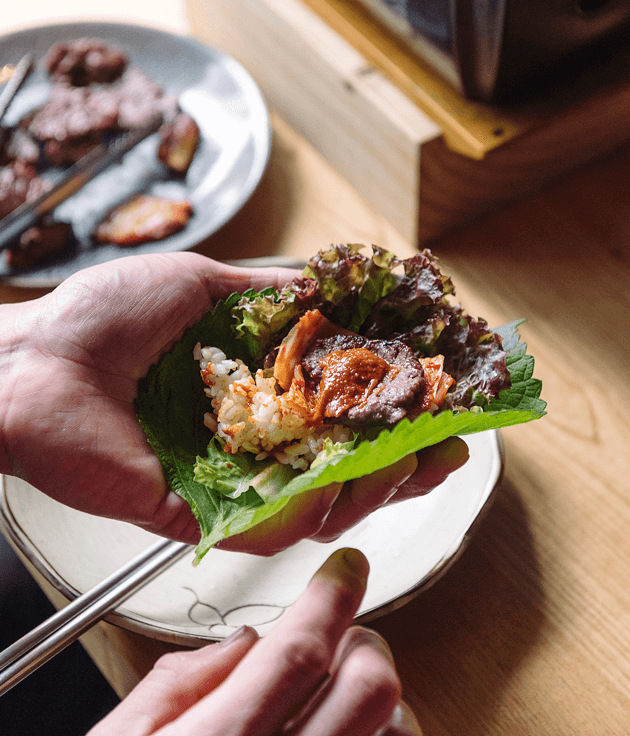
It’s a thorny subject, but it’s just reality that people from different cultures view food through altered lenses. After all, how do you attempt to deconstruct or remove feelings of home and longing from your taste buds? “The feedback from my country people is a bit different overall. But then my wife, Grace, says, “Min, you’re more than Korean. You’re trying to do something different — you cannot please everyone.” He can’t, but that doesn’t stop anyone from wanting to please. When Baek makes a new dish, he cranes his head out of the kitchen to watch for a reaction.
There are many reasons, both simple and complex, as to why Han is only the second Korean restaurant on the list. When I ask Baek why he thinks this is so, he tells me it’s the service. “All Korean restaurants are struggling with the Western style of service. For example, we don’t have wine culture in Korea.” Although Korea does have a highly structured drinking culture, with rules on which member of the table pours, and proper etiquette in how to receive your drinks, wine hasn’t quite entered the dining consciousness. Having a glass of wine is synonymous with good food and a good restaurant in Auckland, so assimilation in this, and in service, is necessary.
It’s been a learning curve — steep at the beginning and never-ending — as a chef, a restaurant owner, an employer, and as a husband. “Compared to other chefs, my experience is short. Normally chefs start from 18 years old, or even younger. I started at 24. Every chef works hard, but I can say I work harder than others. I go [in] earlier than others. I finish later than others. I push hard, but my experience is still short.”
Baek is a chef living life on the edge. Let’s hope he’s on the edge of something great, too.
Han was one of Metro’s Top 50 Restaurants in 2019, receiving a four-spoon review. Baek was a finalist for Best Chef in the Metro Peugeot Resturant of the Year awards. See all this year’s winners here.

